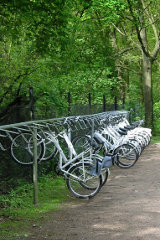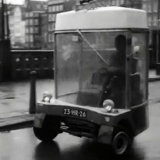 Although bike share systems are increasingly popular all over the world, they have failed to catch on in Amsterdam, the city where bike sharing was invented.
Although bike share systems are increasingly popular all over the world, they have failed to catch on in Amsterdam, the city where bike sharing was invented.
British newspaper The Guardian asked the inventor of bike sharing, Luud Schimmelpennink, about the reason behind this lack of popularity.
In the mid-1960s members of the Provo movement were asking all kinds of questions of the Dutch establishment (the name Provo stands for provocation) and they were not liking the answers they were getting. Young engineer Luud Schimmelpennink was tackling the question of personal transport. In 1965 he proposed and implemented an alternative to the “gaudy and filthy motor car”, the white bicycle.
Schimmelpennink envisioned bikes that weren’t locked and that would be left wherever their riders needed to be. Provo painted 20 bicycles white and left them in the city, but these bikes were promptly impounded by the police.
“The first Witte Fietsenplan was just a symbolic thing,” Schimmelpennink told the Guardian last week. “We painted a few bikes white, that was all. Things got more serious when I became a member of the Amsterdam city council two years later.”
“My idea was that the municipality of Amsterdam would distribute 10,000 white bikes over the city, for everyone to use. I made serious calculations. It turned out that a white bicycle – per person, per kilometre – would cost the municipality only 10% of what it contributed to public transport per person per kilometre.”
The council soundly rejected his plan and told him that they saw a great future for the private motor car. This inspired Schimmelpennink to work on his White Car Plan instead – still using clean(ish) energy.
There is a phrase in Dutch – de wet van de remmende voorsprong, meaning ‘the law of the handicap of a head start’. The fact that Amsterdam was the first to experiment with bike sharing perhaps helps explain why it is late in its implementation. Or perhaps Amsterdam doesn’t need a bike share scheme, because everybody either owns a bike or can readily rent one from OV Fiets or the many bike shops in the city.
Schimmelpennink’s vision wasn’t wasted though, as he inspired other cities throughout the world to implement their own bike sharing schemes. And even his own plan got implemented, just not in Amsterdam. The Hoge Veluwe nature reserve has bikes that have been painted white and that are free to use. The program started in 1974 with 50 bikes and exists to this day. It currently consists of 1,800 bicycles.
(Photo of white bicycles in Hoge Veluwe by Ellywa, some rights reserved)

 The video shown here from the Netherlands Institute for Sound and Vision contains a short news item about the Witkar (literally White Car) invented by famous provo Luud Schimmelpennink.
The video shown here from the Netherlands Institute for Sound and Vision contains a short news item about the Witkar (literally White Car) invented by famous provo Luud Schimmelpennink.